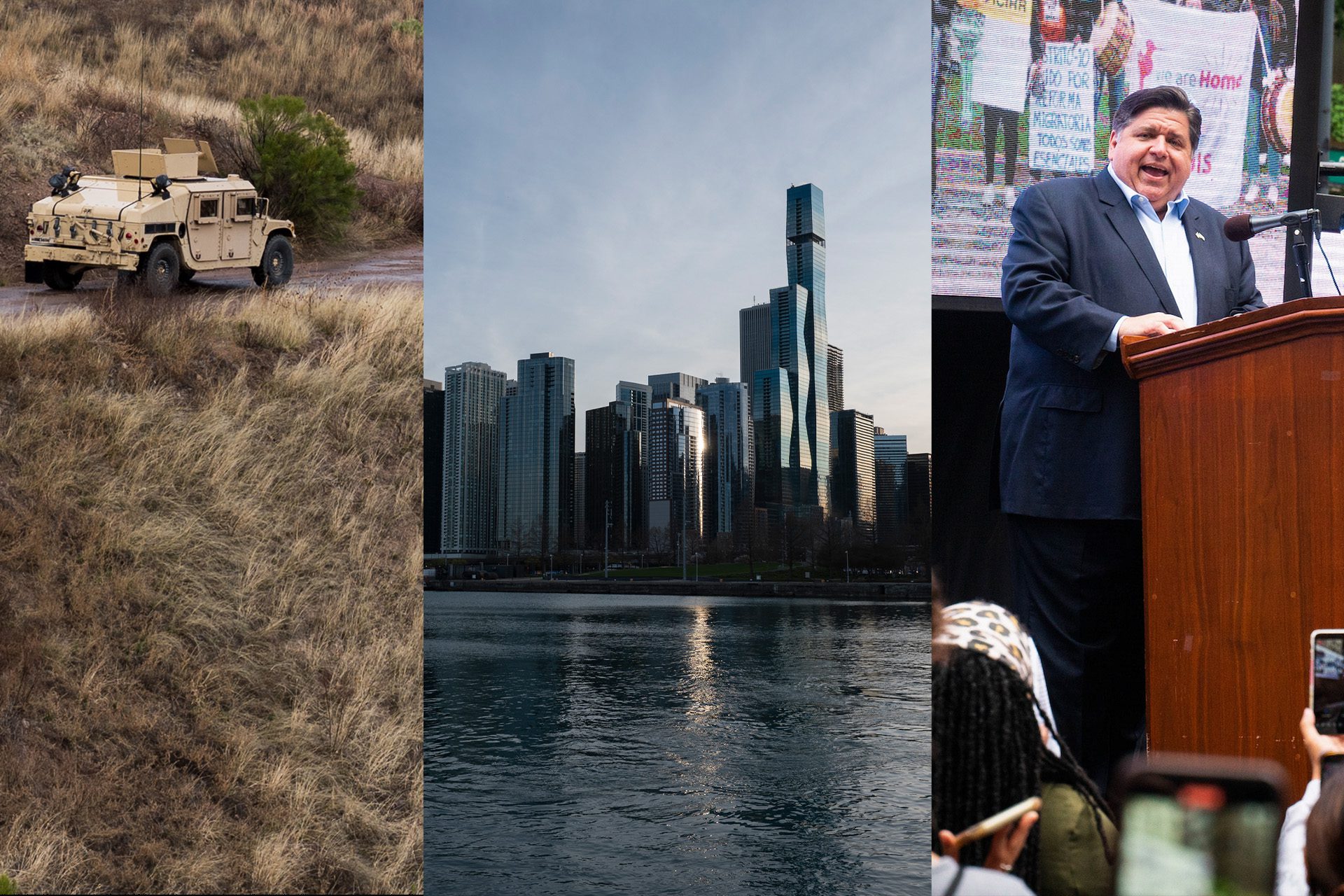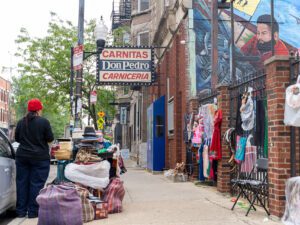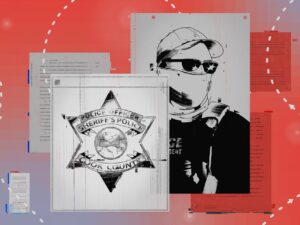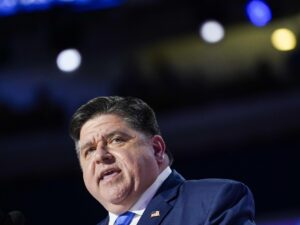 Photo illustration by Max Herman/Borderless Magazine. Photos by Max Herman and Camilla Forte/Borderless Magazine
Photo illustration by Max Herman/Borderless Magazine. Photos by Max Herman and Camilla Forte/Borderless Magazine The federal government has previously used the National Guard dozens of times for conflicts, and hundreds more for local crises and national emergencies. Illinois leaders say Trump’s plans to deploy the National Guard to Chicago are “unwarranted.”
Illinois officials and local community groups pushed back against President Donald Trump’s threat to deploy the National Guard in Chicago.
Gov. JB Pritzker, alongside local Democratic officials, on Monday said that no emergency in Chicago warrants the deployment of the National Guard and stressed the reduction in the city’s overall crime rates.
“This is exactly the type of overreach that our country’s founders warned against,” Pritzker said. “It’s the reason they established a federal system…built on checks and balances.”
News that puts power under the spotlight and communities at the center.
Sign up for our free newsletter and get updates twice a week.
Pritzker said no one from his administration received notice of a deployment, and the federal government has made no effort to coordinate with the city.
Donald Trump recently deployed the National Guard and military to Los Angeles and the District of Columbia, a move he has defended as a way to reduce crime and homelessness. Critics like Prtitzker have called the action an abuse of power and a misuse of the nation’s army.
“Donald Trump is attempting to manufacture a crisis, politicize Americans who serve in uniform, and continue abusing his power to distract from the pain he is causing working families,” Pritzker said.
Read More of Our Coverage
When has this been done before?
The U.S. president and state governors may call on the National Guard for large-scale crises or national disasters.
Historically, the federal government has previously used the National Guard dozens of times for conflicts and hundreds more for local crises and national emergencies, Al Jazeera reported.
In 1965, President Lyndon B. Johnson sent out over 3,000 troops to Selma, Alabama, to protect civil rights demonstrators without a request from the state’s governor.
Federal troops were also dispatched to respond to the LA Riots at the beginning of the year, Hurricane Katrina in 2015, the COVID-19 pandemic, and the George Floyd protests in 2020 in several cities, including Chicago.
Then-Mayor Lori Lightfoot said it was a decision she didn’t make lightly.
Still, some say it’s rare for the president to deploy the National Guard without a state’s consent. The Tenth Amendment gives all powers not explicitly delegated to the federal government to the states or the people.
Trump said he dispatched the National Guard to D.C. to quell crime in the city, even though the city has seen the lowest levels of violent crime in 30 years, according to the D.C. Metropolitan Police Department.
Trump also previously dispatched the National Guard in D.C. hours after the insurrection at the Capitol began in 2021. Rioters injured Capitol police, vandalized the state building and broke into the Capitol building before the National Guard was dispatched.
More recently, Trump sent the National Guard, without notifying the California Governor and other local leaders, to assist Immigration and Customs Enforcement (ICE) raids in Los Angeles.
California Gov. Gavin Newsom told NPR the president was “sowing more division” and that “He’s inciting just the same and more far, more anxiety, more likelihood that people are going to be hurt.”
Newsom filed a federal lawsuit accusing Trump of violating the Tenth Amendment of the U.S. Constitution and the Posse Comitatus Act, which prevents the president from using the military to enforce federal laws. He requested that the tax payer cost of the president’s national guard deployment be made public.
“It’s been 60 days since the federal government deployed the military against its own citizens, over the objection of state and local officials,” Newsom said in a press release. “Americans deserve to know how much taxpayer money the president spent to orchestrate this political theater.”
Critics like the American Civil Liberties Union of Illinois argue that there has not yet been an order federalizing forces.
“Until we see a specific order and justification for sending federal forces, it is difficult to know the legality of that order,” said Ed Yohnka, ACLU director of communications and public policy. “It is clear that there is no emergency that justifies the introduction of these forces into Chicago.”
The advocacy organization also contended that the National Guard is generally meant to serve the American people in a crisis.
“Instead, the force is now being organized to be used against the American people and elected officials when they refuse to bend the knee to the President,” said Yohnka.
Read More of Our Coverage
Rhetoric vs Crime Data
Last week, Trump applauded the arrests made by the National Guard and law enforcement in D.C. and said Chicago would be next to curb violence in the city. The Pentagon has had plans to deploy troops to Chicago for weeks, according to a report by The Washington Post.
Trump vowed to rid Chicago of crime and called the city “a mess.”
However, overall violent crime rates in Chicago have decreased by more than 20%, with shootings and homicides down more than 30% year-to-date, according to NBC 5 Chicago.
Chicago Mayor Brandon Johnson said the National Guard “has the potential to inflame tensions between residents and law enforcement.”
“We know that our communities are safest when we fully invest in housing, community safety, and education,” Johnson said in a statement last week. “There are many things the federal government could do to help us reduce crime and violence in Chicago, but sending in the military is not one of them.”
Pritzker expressed a similar sentiment on Monday, noting that Chicago’s crime rates are lower than those of other cities in Republican-led states like Tennessee and Mississippi.
“If Donald Trump was actually serious about fighting crime in cities like Chicago, he, along with his congressional Republicans, would not be cutting over $800 million in public safety and crime prevention grants nationally,” he said.
Pritzker and Johnson called on Trump to invest in affordable housing, mental and behavioral healthcare services and more resources to stop the flow of guns into the city, instead of spending on deploying federal troops to cities.
“The best way to build safe and affordable cities is to invest in them,” Johnson said.
How are local organizations responding?
In an email to parents, Chicago Public Schools acknowledged “anxiety and fear about safety at school and the broader community” in the face of potential increased federal presence. CPS officials said the “safety of students, families and staff was the district’s top priority.
Among the precautions taken, district officials told parents they do not ask families’ immigration status, nor coordinate with federal agents and would not allow ICE agents access to schools.
Meanwhile, local organizations gathered downtown this week to publicly oppose Trump’s deployment of the National Guard.
“We know that Trump and his loyalists are going to continue targeting Chicago and Illinois,” said deputy director of the Illinois Coalition for Immigrant and Refugee Rights (ICIRR), Veronica Castro. “But we also know that we will continue looking out for one another.”
Castro urged listeners to remain up-to-date on Know Your Rights trainings and fight against injustices.
Brandon Lee, the director of communications at ICIRR, said the organization would continue to actively distribute Know Your Rights materials, increase work within its Family Support Network Hotline and organize local rapid response teams as military presence is expected to increase.
“We reject the use of the military in our communities, and will continue to demand that troops and ICE get out of our city and our state,” said Lee.
Congresswoman Delia Ramirez encouraged Chicagoans to keep protesting.
“Donald Trump is trying to ensure we stop protesting,” she said. “Not doing a rally, or protest or press conference is exactly what he wants. We are not going to give him that pleasure.”
Pritzker encouraged Chicagoans who are looking to protest to do so peacefully.
“The state of Illinois is ready to stand against this military deployment with every peaceful tool we have.”
Tara Mobasher is a Northwestern Medill Reporting fellow at Borderless Magazine. Email Tara at [email protected].




